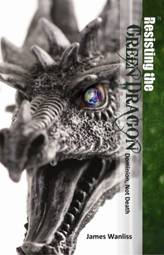
 Review of J Wanliss’ book ‘Resisting the Green Dragon: dominion, not death‘
Review of J Wanliss’ book ‘Resisting the Green Dragon: dominion, not death‘
Ian Hore-Lacy, December 2013.
Download PDF
J Wanliss
Resisting the Green Dragon: dominion, not death
Cornwall Alliance, 2nd edn, 2013, Burke VA USA, 272 pp. + endnotes and index
ISBN 13: 9781886568587
Reviewed by Ian Hore-Lacy
This book claims to expose and challenge ‘the religious machinery that forms the foundations of environmentalism’ by detailing its values and contrasting them ‘with the Christian virtues that built Western Civilization’. So no shades of grey are expected and the reader wonders about the treatment of possible congruence. It’s hard to disagree with the assertion that
the Christian community must be part of the solution but instead often abounds with unbiblical views of man and nature;
the book unpacks the author’s view of all that. Copious end-notes (635 of them from 250 pages) indicate research, albeit highly selective, and lead us to expect the fruits of this rather than the simple assertions which turn out to be frequent.
The author acknowledges that many environmentalists are well-meaning people of goodwill and many profess faith in Jesus Christ. ‘They care deeply about the world’ and that ‘should be a Christian virtue’. But many are duped by the environmentalist movement, the ‘Green Dragon’, which has diabolical origins and an agenda that has little to do with the natural environment.
From the writings and persistent public declarations of prominent environmentalists it is clear the ethos of the Green movement fosters deep animus and hostility towards humanity.
Though all of us could think of situations where that cap fits, it is a sweeping statement to introduce the book!
Chapter 2 documents the effective takeover of the US National Council of Churches by liberal and environmental influence.
A key chapter (3) looks at how humans are created in God’s image, rather than being mere animals. There is much here that is sensible exposition, and helpful critical contrast with atheist or pantheist views. But extraordinarily, mainstream science and hermeneutics are ignored, though (apart from some silly remarks) not actually argued against. Whether the author holds to a young-earth creationist scientific view, or whether he avoids the questions of time scale and method of God’s working in order not to aggravate young earth creationist readers in the US context, is not made clear, though an earlier statement that
Modern environmentalism and Darwin’s dangerous idea are coupled together like a nest of writhing snakes
p. 70
makes the author’s position clear. Saying that many professing Christians ‘despise God’s Word’, apparently by pursuing science, does not advance any coherent epistemology. Targets of critique are Peter Singer, Sallie McFague and Al Gore, as if these represent mainstream thinking in relation to the topic. Then we return to the broader subject of the book and find that
the Green Dragon … would have us deconstruct the human being and his civilization into pure animality,
p. 93
with maybe a nod to pantheism. Much of the chapter deals with reason, righteousness, holiness, sin and grace, which in their orthodox sense are hardly the preoccupations of the environmental movement, but very relevant to a Christian view of humankind.
The book focuses on environmentalism as an ideology and any scientific drivers of environmental concerns are dismissed. In contrast to the whole Christian basis of scientific discovery and the deployment of technology based on it, the author treats science as suspect and shows no understanding of it at all. But the technology is, in my view, rightly applauded as an aspect of human dominion.
For anyone, like me, whose understanding of the world depends on an appreciation of God’s creation informed by science, this will be a very unsatisfactory book. But its main thesis, that the church has too uncritically bought into environmental agendas which are shaped by alien values and worldview, is correct, if overstated. Unfortunately arguing that case while treating science as suspect is not likely to persuade anyone I can think of.
In the same way as we can lazily perceive all Muslims as rabid Islamicists, so Wanliss tends to tar many of those with environmental concerns as fellow-travellers with the diabolical dragon. The ‘passionately religious’ Maurice Strong is identified as ‘possibly the most influential environmentalist in the world’ who has ‘defined a significant proportion of [that] agenda’ (p. 60). John Holdren and Paul Ehrlich are his supporting cast. Sustainability is a harmful and dangerous chimera, contrary to people’s needs (ch. 6).
While there are some good and positive points in this book, and even worthwhile critique, there is a lot of tedious dross and I would not recommend it for general reading or as anything more than an insight to a vocal part of American evangelicalism.
Review by Ian Hore-Lacy who is Senior Research Analyst, World Nuclear Association, based in London, and is a Fellow of ISCAST.

